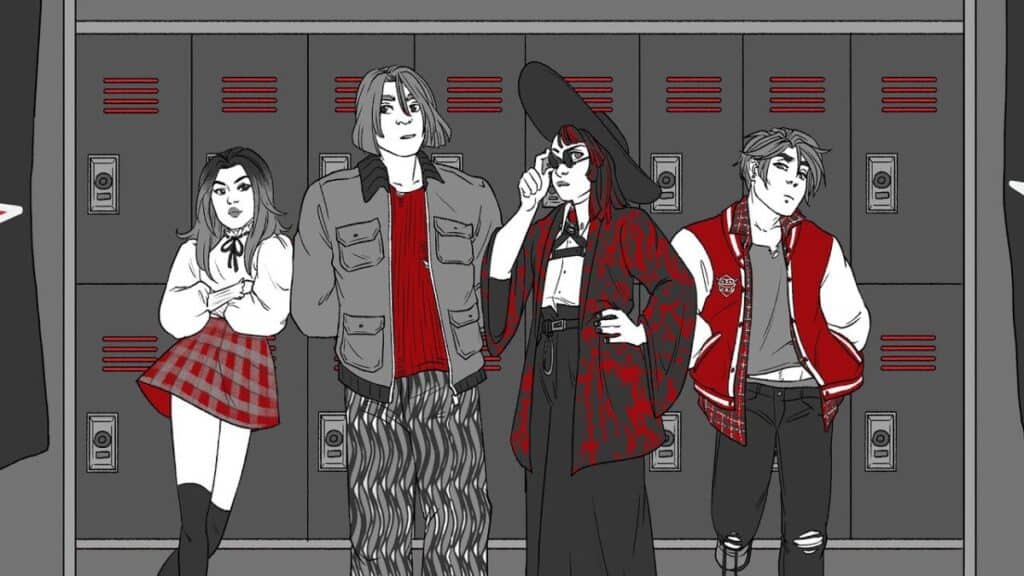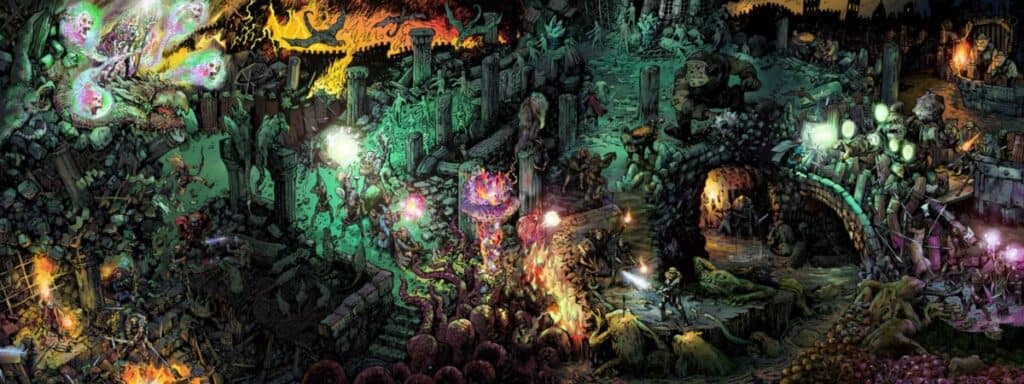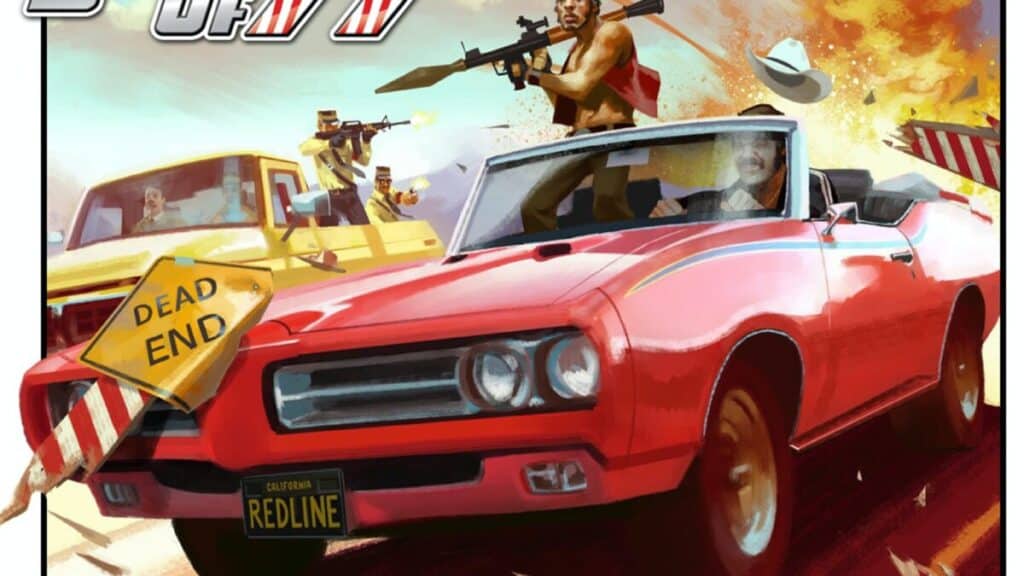When the indie roleplaying game, Apocalypse World was released just over 10 years ago, it inspired many designers to make their own clones. This is because Apocalypse World used a simple, elegant system of conflict resolution and character development. Here is what you need to know about Powered by the Apocalypse games.
PbtA uses a simple dice mechanic combined with evocative system that allows you to play any type of story. As Players describe what they do in a scene, the Game Master calls them to do a Move, which requires a 2d6 dice roll. Even an average roll means a partial success or success with a cost.
The crazy, mind-blowing feature of a PbtA game is the Game Master never once rolls any dice. She is 100% focused on the story, keeping the narrative moving, and sharing spotlight between the players.
While Players will call out which “Moves” (powers or abilities) they are using, these games try to keep the players focused on the awesome things their characters are trying to do. The Game Master then calls for a Move when the outcome is uncertain.
Each Playset has its own Moves and Playbooks. The Playset may provide for additional character statistics or modifiers that are applied to rolls. There is not much more to the mechanics of PbtA games.

Playbooks
PbtA uses a class-based character system, which is unusual for an Indie game system. Class-based systems are the canonical, old-school RPG design starting with Dungeons and Dragons. Whereas point-buy systems allow you to mix-and-match powers and skills without the boundaries and niche protection of class systems.
The character system is called Playbooks. Each Playset will come with a handful or more of Playbooks. What makes PbtA different from class systems is no two Players will use the same Playbook.
Character creation is a highly curated process. After picking your Playbook, the first page generally runs you through character creation from top to bottom of the page. The backside is where you track leveling and getting more Moves. There is nothing else you need to refer to for completing your character other than the Playbook.

At each choice you either write in an entry or check a box to represent your choice. What is important is the Special Moves only available to that one Playbook. The Playset I am most familiar with is Dungeon World, so that will be the primary examples I will be drawing from.
For example, the Warlock Playbook from Dungeon World gives that character the following Special Move:
Soul’s Price
When you spend time getting to know someone, roll +Wis. On a 10+, your servants whisper to you one thing that person truly desires. On a 7-9 you learn of one thing they truly desire, but they sense something of your true nature.
Getting to know someone is a general Move. That means when your Warlock chats up a patron at the Inn, the Game Master may tell them something juicy about that person.
Advancement
To understand how advancement or leveling up your characters, you need to know more about the dice mechanic. As mentioned above, every Move requires a 2d6 roll plus a modifier if that is part of your Playset’s system:
- 10+: Success, what you were trying to do happens the way you want it
- 7-9: Partial Success or Success with a Cost, you got what you wanted, but you also got more than you bargained for.
- 6-: Failure with a Cost.
Every time your character fails (rolls a 6 or less on a move), they make a mark or check on their character’s xp box. Each Playset will determine how much XP (how many failures) you need to level up. In PbtA, your characters only learn by trying and failing. This is starkly contrasted to Call of Cthulhu where your skills only have the possibility of advancing if you succeed on a check.

Moves
Moves are what characters do. Moves are what Game Masters invoke as the player describe their character’s actions.
Game Master: As the party fiddles with the depressed pressure plate, 10 goblins rush into the room from a secret side passage to your left.
Fighter: I bang my shield with my sword as I run straight at them yelling like a madman.
Game Master: Are you trying to swing with your sword or do something else?
Fighter: I am trying to get their attention and keep it focused on me while the Thief figures out the pressure plate in the middle of the room.
Game Master: Then it sounds like you’re Defying Danger, please roll your +CHA as you are trying to keep all eyes on you.
Again, each Playset will have its own general moves that all characters can access. In Dungeon World, those include:
- Hack and Slash
- Volley
- Defy Danger
- Defend
- Spout Lore
- Discern Realities
- Parley
- Aid
Each of these are self-explanatory if you are at all familiar with Fantasy Roleplaying. These can and should be used at any time. Dungeon World also has some Special Moves for more specific situations. These include:
- Encumbrance
- Last Breath
- Carouse
- Recover
- Recruit
Then, as I covered above, each Playbook has its own Moves only available to that character.
Combat
In PbtA games, combat is a free-flowing affair. There is no turn order, no initiative, not even an action economy. If you’re not sure what I mean by an action economy, let us use Dungeons and Dragons 5th Edition as an example.
In Combat you have three actions that you can take. A move action allows you to move your speed and do a free action like unsheathing a weapon or opening an unlocked door. A bonus action is usually a small action that is quick that your class is especially good at. Then an Action can be movement, casting a spell or attacking. Once you’ve used your Actions your turn is over.

With PbtA games, all of that is thrown out the window because the monsters or enemies in combat do not have their own turns! While each monster has a damage value associated with them, they do not have a to-hit bonus or anything like that. They may have a range to show how close they have to be to do any damage or have an effect on the players.
Remember, the Game Master never rolls dice in PbtA games! When a Character is acting aggressively towards a monster or foe and invokes a Move, they must roll. Remember a 7-9 is a partial success or a success with a cost. On a 6-, then it was a Failure with a cost.
If it was a Hack and Slash Move, they hit but maybe did less damage. However, maybe the monster hit them too! The player not only rolls their damage, but also the monster’s damage to them. A failure means only the Character is taking damage from the Move.
This is why an action economy is irrelevant in PbtA Games. Combat is literally handled in the same way as the rest of the game. It is just more likely that a failure or partial success will result in physical harm to the Character.
Bonds
The other mechanic that Powered by the Apocalypse uses is Bonds. Bonds are statements that connect two players together. Playbooks usually include several bonds with fillable blanks. You are generally supposed to fill in the names of the other characters in those blanks. Sometimes it is more of a Madlib style of fill-in.
As an example from Dungeon World, these are examples of suggested Bonds:
- I must hide my true nature from ___________.
- ________ thinks me a charlatan, I’ll show them!
- I study at _________’s feet and learn their secrets.
- I respect the beliefs of _______, but hope they will someday see the true way.
It is expected that through play your bonds will be resolved and replaced with new ones. Some bonds do require the consent of the other player. The second one above is an example of this. But mostly they govern how your character relates to the other characters.
Bonds are not suppose to be just passive things on your Playbook. They should inform your play and character choices in scenes. They should then result in some sort inter-character conflict and resolution.

Again, the second example above means that one character thinks your character is a fake. The other player should find opportunities to make snide comments whenever your character uses their powers. At some point, the two characters are going to need to talk it out.
At the end of each game session, each player is encouraged to review their active bonds. A bond is resolved when it no longer describes how your character relates to the other character. If you and the other character agree that bond has been resolved, then you get to mark an XP. You must also write a new bond.
Dungeon world suggests the following when writing a new bond:
Pick something relevant to the last session—maybe a place you traveled together or a treasure you discovered. Choose a thought or belief your character holds that ties the two together and an action, something you’re going to do about it.
Dungeon World page 33
Bonds encourage intra-party drama, but also resolution of that drama by awarding XP.
Playsets
With the open licensing rules and light mechanical heft, it is easy for game designers to make their own Powered by the Apocalypse Playsets. This means there are a ton of different PbtA games to choose from. This also means the quality of those Playsets can also be varried.
If you want to listen to Actual Plays of various PbtA Playsets, I recommend the Happy Jacks Podcast. The following are their PbtA games:
- Idolon Academy: Masks
- Seventh Vale: City of Mists
- Monsoon: Demigods
- Vault 818: Apocalypse World
- Carefree High: Monsterhearts
- Revelations: Demigods
- Just Us Heroes: Masks
- Various Oneshots using PbtA Playsets
Links to where you can get these games, and others, can be found over here.
If you want to explore the wilder (and wider) world of tabletop roleplaying games go there! If you want to start to learn on how to paint miniatures, click already! Or maybe you want to read more of my posts about Dungeons and Dragons, then click away here!
